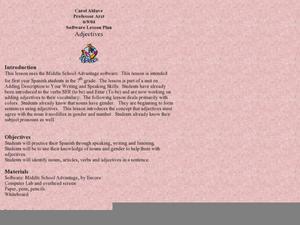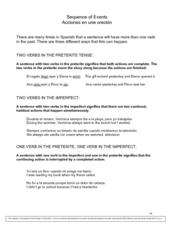Curated OER
Spanish 1 Chapter 3
Students explore the pronouns ir, estar, ser, tener, querer, poder, and jugar. They do a word scramble using 8 words from chapter, and clues needed to be in the Spanish sentences. Students design concept poster from using 10 vocabulary...
Curated OER
Future Actions
How do you conjugate a reflexive verb? This plan suggests reading a children's book to your intermediate Spanish speakers. Follow the reading with a PowerPoint slide show that presents reflexive verbs, a sentence using the verb, and a...
Curated OER
Conjugate Tener
Define the verb tener to start this simple exercise. Twenty fill in the blank sentences are provided, and beginning Spanish learners must complete each with the correct form of the target verb, tener. Have early finishers work on...
Curated OER
Maggie's Adventures Grades 1-2
Students use Maggie's Learning Adventures online activity. They play a matching or memory game to become aware of homophones. Students recognize that there two ways to use many words. They practice with noun or verb identification by...
Curated OER
Software Lesson Plan
While this plan uses Middle School Advantage software by Encore, you could still use the attached worksheet if you don't have access to the program. Encourage Spanish learners to work with different adjectives and write descriptive...
Curated OER
Seem & Look like
In this grammar learning exercise, students choose the appropriate helping verb, seem or look like, to complete ten sentences grammatically correct.
Curated OER
Sequence of Events
Your intermediate and advanced learners can expand their conversation skills when they learn how to express multiple past events in the same sentence. This reference guide provides helpful commentary, examples, and translations.
Curated OER
Direct, Indirect, and Reflexive Pronouns
Provided here is a thorough review of direct, indirect, and reflexive pronouns. First learners study the chart for direct object pronouns, reading through the Spanish and English equivalencies. Then, they read the bulleted information...
Curated OER
¿Ser o Estar?
¿Ser o estar? That is the question! These two are often confused, and if your learners really want to develop their language skills, they need to know the difference! Use this reference sheet to thoroughly explain each ver. The chart...
Curated OER
¿Qué hora es?
Use this resource to quiz your language learners on telling time. Two exercises are provided; the first one asks quiz takers to use the digital time to write out the time in Spanish. The second exercise is the exact opposite: learners...
Curated OER
¿Tú o Usted?
In English, we only have one word that means you, but in Spanish, speakers can use either tú or usted. Print this sheet for your beginning speakers to introduce them to this idea. First, read through the information provided, and then...
Curated OER
Las Palabras Interrogativas
Learn how to use the Spanish interrogative words: quien, que, and cuando in this PowerPoint. The correct use of these words are outlined and organized in great detail, followed by ten enrichment question for students to answer. Tip: Ask...
Curated OER
Dar/Comprar/Traer
Complete these interactive sentence jumbles to practice using the Spanish verbs dar, comprar, and traer. Each slide shows the different words neccessary to complete the sentence; as you flip through, the incorrect words disappear. Then,...
Curated OER
Expressions with Tener Explanation
Study tener and show beginning Spanish speakers common expressions that use this verb. But wait! Tener can also serve as a form of the verb "to be?" There's a great chart that helps clarify the verb and its purpose in different situations.
Curated OER
Understanding Questions
Using the five examples provided, Spanish language learners discover the easy way to break down a question and understand what it's asking. They practice finding the question word, finding the verb, and finding the subject of the...
Curated OER
The Personal a-Explanation and Practice
What is the personal a? It's a tricky concept to Spanish language learners, but this worksheet makes it simple. Examples and an explanation precede a short practice exercise. A great way to introduce your learners to the topic, but...
Curated OER
Ojala y Quizas: El subjuntivo
The Spanish expressions meaning "hopefully" and "maybe" are always followed by the subjunctive. The top half of this instructional activity provides an explanation and clear examples, while the bottom half provides a short practice...
Curated OER
Direct & Indirect Object Pronouns
There is a wealth of information provided here about direct and indirect object pronouns. Consider breaking these complex grammatical concepts into smaller chunks so that your Spanish language learners do not become overwhelmed. The At a...
Curated OER
Los participios irregulares (El presente perfecto)
Provide your intermediate to advanced Spanish class with practice using irregular participles in the present perfect tense. Simple fill-in-the-blank sentences are provided here, but consider providing a few sentences in English and...
Curated OER
El Condicional
Are you introducing your intermediate and advanced Spanish speakers to the conditional? Learners conjugate the word in parentheses and insert it into the sentence provided. There are twenty sentences.
Curated OER
Object Pronouns with Commands
Intermediate and advanced Spanish language learners will appreciate knowing how to shorten their sentences when making commands. After all, native language speakers usually use informal language when conversing with other native...
Curated OER
Practice with Dar
What does dar mean? How do you conjugate it? Learners use the chart provided to conjugate the target verb. Then, in the second exercise, they use the correct form of the verb to complete each sentence.
Curated OER
Tu o Usted? Explanation and Worksheet 1
What is the difference between using tú or usted? This worksheet provides a thorough, clear explanation, and there's an opportunity to practice. The exercise lists different people and asks the learner to identify whether the informal or...
Curated OER
Some Adverbs from Feminine Adjectives Grow
Looking for a clear explanation of Spanish adverbs? Here it is! There's a set of seven bullet points that gives the rules, and there is a short practice activity at the end.
Other popular searches
- Conjugating Spanish Verbs
- Irregular Verbs Spanish
- Reflexive Verbs in Spanish
- Past Tense Verbs Spanish
- Conjugate Verbs Spanish
- Reflexive Verbs Spanish
- Spanish Verbs Preterite
- Basic Spanish Verbs
- Conjugate Verbs Spanish
- Spanish Verbs Present Tense
- Present Spanish Ar Verbs
- Er Verbs Spanish

























